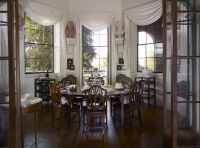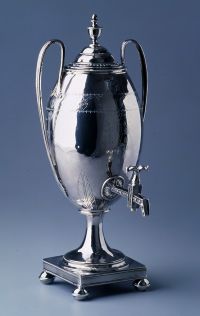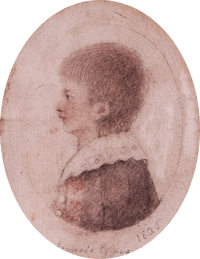
 Like many Americans in the early nineteenth century, Thomas Jefferson and his family ate only two meals a day at Monticello: breakfast, typically at eight, and dinner, in the late afternoon. Both meals were served in the Dining Room, and, if extra space were needed, in the adjoining Tea Room. Before every meal, two bells rang to alert family and guests, one to call them to the table, and one when the meal was served.
Like many Americans in the early nineteenth century, Thomas Jefferson and his family ate only two meals a day at Monticello: breakfast, typically at eight, and dinner, in the late afternoon. Both meals were served in the Dining Room, and, if extra space were needed, in the adjoining Tea Room. Before every meal, two bells rang to alert family and guests, one to call them to the table, and one when the meal was served.
"Fresh from the Oven"
Several guests recorded accounts of breakfast at Monticello. One visitor in particular, Mrs. Margaret Bayard Smith, spent time with Jefferson both in Washington, D.C., during his presidency, and also in Charlottesville, in the summer of 1809. Her excellent accounts of these visits are included in the book, The First Forty Years of Washington Society, and reveal much about daily life at Monticello.
Mrs. Smith wrote: "Our breakfast table was as large as our dinner table; . . . we had tea, coffee, excellent muffins, hot wheat and corn bread, cold ham and butter." Fifteen years later, Daniel Webster enjoyed an almost identical breakfast at Monticello, partaking of "tea or coffee, bread always fresh from the oven . . ., with a slight accompaniment of cold meat."
Seated Around the Table
 Even without guests, who were ever-present at Monticello, the Jefferson breakfast table served many. Although Jefferson's wife Martha Wayles Skelton died in 1782 after "ten years in unchequered happiness," he did not live alone. At different times his widowed sister Martha Jefferson Carr and her six children lived at Monticello; his sister Anna Jefferson Marks also frequented the mountaintop.
Even without guests, who were ever-present at Monticello, the Jefferson breakfast table served many. Although Jefferson's wife Martha Wayles Skelton died in 1782 after "ten years in unchequered happiness," he did not live alone. At different times his widowed sister Martha Jefferson Carr and her six children lived at Monticello; his sister Anna Jefferson Marks also frequented the mountaintop.
 In addition, his daughters Martha Jefferson Randolph and Maria Jefferson Eppes, the only two of his six children who survived to adulthood, were frequently at Monticello. Mrs. Randolph served as her father's hostess both during his second term as president and afterwards in his retirement. Though Mr. and Mrs. Randolph owned a nearby farm, they and their children lived with Jefferson on the mountaintop throughout his retirement. Following the death of Jefferson's daughter Maria in 1804, his grandson Francis Wayles Eppes (pictured below) frequently joined the crowd. All this prompted Jefferson to write to John Adams, "I live in the midst of my grandchildren."
In addition, his daughters Martha Jefferson Randolph and Maria Jefferson Eppes, the only two of his six children who survived to adulthood, were frequently at Monticello. Mrs. Randolph served as her father's hostess both during his second term as president and afterwards in his retirement. Though Mr. and Mrs. Randolph owned a nearby farm, they and their children lived with Jefferson on the mountaintop throughout his retirement. Following the death of Jefferson's daughter Maria in 1804, his grandson Francis Wayles Eppes (pictured below) frequently joined the crowd. All this prompted Jefferson to write to John Adams, "I live in the midst of my grandchildren."
Jefferson the Grandfather
 For Jefferson, living with his grandchildren was a pleasure. Mrs. Smith reported that "he seemed delighted in delighting them," and noted that "while I sat looking at him playing with these infants, one standing on the sopha with its arms round his neck, the other two youngest on his knees, playing with him, I could scarcely realize that he was one of the most celebrated men now living, both as a Politician and Philosopher." Jefferson was an involved grandfather, teaching Ellen how to play chess, buying Virginia a guitar, and sharing the delights of the flower garden with Anne. Granddaughter Ellen Wayles Randolph remembered: "He took pains to correct our errors and false ideas, checked the bold, encouraged the timid, and tried to teach us to reason soundly and feel rightly. . . . He was watchful over our manners, and called our attention to every violation of propriety. He did not interfere with our education . . . except by advising us what studies to pursue, what books to read, and by questioning us on the books which we did read."
For Jefferson, living with his grandchildren was a pleasure. Mrs. Smith reported that "he seemed delighted in delighting them," and noted that "while I sat looking at him playing with these infants, one standing on the sopha with its arms round his neck, the other two youngest on his knees, playing with him, I could scarcely realize that he was one of the most celebrated men now living, both as a Politician and Philosopher." Jefferson was an involved grandfather, teaching Ellen how to play chess, buying Virginia a guitar, and sharing the delights of the flower garden with Anne. Granddaughter Ellen Wayles Randolph remembered: "He took pains to correct our errors and false ideas, checked the bold, encouraged the timid, and tried to teach us to reason soundly and feel rightly. . . . He was watchful over our manners, and called our attention to every violation of propriety. He did not interfere with our education . . . except by advising us what studies to pursue, what books to read, and by questioning us on the books which we did read."
Mrs. Smith concluded her account of the family's breakfast by noting that the children "eat at the family table, but are in such excellent order, that you would not know, if you did not see them, that a child was present. After breakfast . . . it was the habit of the family each separately to pursue their occupations . . . . Mrs. Randolph withdrew to her nursery and excepting the hours housekeeping requires she devotes the rest to her children, whom she instructs."

